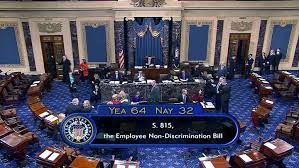The U.S. Senate’s passage last year of the Employment Non-Discrimination Act (ENDA), a bill to ban workplace discrimination on the basis of sexual orientation and gender identity, brought national attention to the issue of job protections for lesbian, gay,  bisexual and transgender (LGBT) Americans. Interestingly, PRRI’s latest survey finds that even after the well-publicized vote, most Americans remain unaware that such employment protections don’t currently exist. In fact, three-quarters (75 percent) of Americans incorrectly believe it is currently illegal under federal law to discriminate on the basis of sexual orientation or gender identity, including roughly 7-in-10 (68 percent) of self-identified LGBT Americans who believe it is currently illegal.
bisexual and transgender (LGBT) Americans. Interestingly, PRRI’s latest survey finds that even after the well-publicized vote, most Americans remain unaware that such employment protections don’t currently exist. In fact, three-quarters (75 percent) of Americans incorrectly believe it is currently illegal under federal law to discriminate on the basis of sexual orientation or gender identity, including roughly 7-in-10 (68 percent) of self-identified LGBT Americans who believe it is currently illegal.
Yet while most people are unaware that employment protections for LGBT Americans don’t exist, a strong majority of Americans support such laws. In fact, more than 7-in-10 (72 percent) Americans favor laws to protect gay and lesbian people from job discrimination, including solid majorities of both political parties and every major religious group.
One reason why employment protections enjoy such significant support may be due to Americans’ perceptions that discrimination against gay, lesbian, bisexual and transgender Americans is an ongoing problem today. Roughly two-thirds (68 percent) of Americans believe gay and lesbian Americans face a lot of discrimination in the United States, while similar numbers (71 percent) say transgender Americans face a lot of discrimination. Self-identified gay and lesbian people are more likely than their heterosexual counterparts to say they face considerable discrimination (83 percent compared to 68 percent).
These continuing perceptions of LGBT discrimination, coupled with broad public support for employment protections, means that regardless of whether the U.S. House of Representatives takes up a vote on ENDA, it is unlikely to be a very controversial one.




